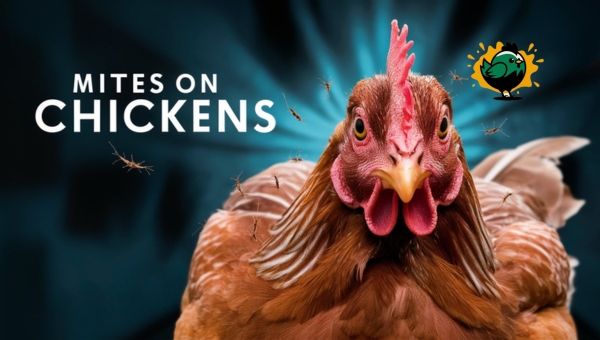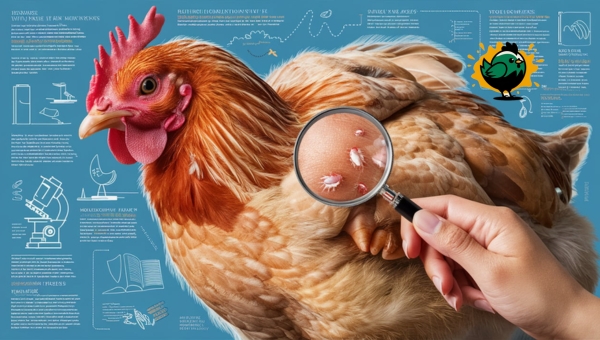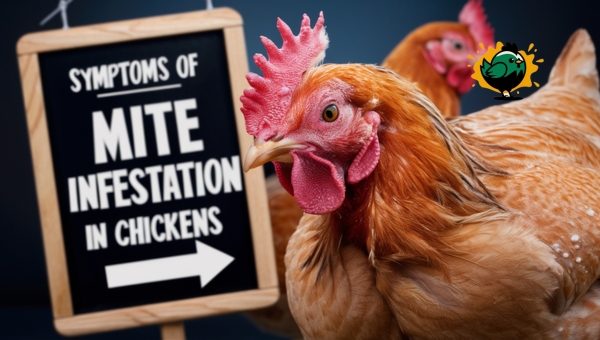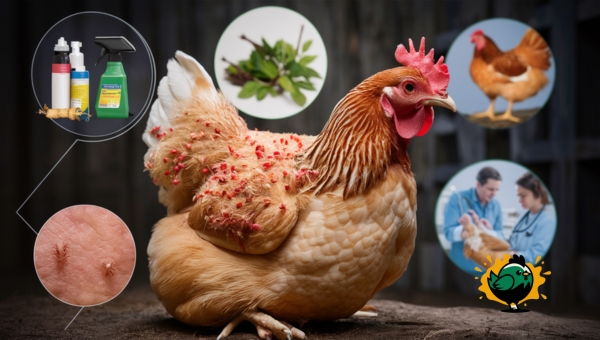Mites On Chickens [Easy Ways to Prevent Infestation]

Finding your flock restless, scratching, and seemingly uncomfortable. This unsettling scenario is all too common for poultry keepers facing mites on chickens. These tiny pests can turn a harmonious coop into a scene of distress, affecting both the health and productivity of your birds.
In this guide, we’re diving into the world of chicken mites, exploring their types, symptoms, prevention, and treatment options. By understanding and tackling this issue head-on, you can ensure your chickens remain healthy and thriving. Ready to delve into the realm of poultry pests? Let’s get started on this crucial journey.
Understanding Mites On Chickens
Mites on chickens can be a significant concern for poultry owners, impacting both the health and productivity of the flock. These tiny parasites live on or around the birds, feeding on their blood, feathers, or skin. The presence of mites can lead to discomfort and stress in chickens, and if left unchecked, can result in severe health issues.

To effectively manage and prevent mite infestations, it’s crucial to understand the different types of mites that affect chickens, recognize the symptoms, and explore prevention and treatment options. By doing so, chicken owners can ensure their flocks remain healthy and productive.
Types Of Mites Affecting Chickens
Several types of mites can infest chickens, each with unique characteristics and effects on the birds:
- Red Mites (Dermanyssus gallinae):
- Characteristics: Red mites are nocturnal parasites that feed on chickens’ blood at night, hiding in cracks and crevices during the day. They are small, about 0.75 mm long, and appear red after feeding.
- Impact: Infestations can cause anemia, reduced egg production, and even death in severe cases. Chickens may exhibit signs of stress and restlessness.
- Northern Fowl Mites (Ornithonyssus sylviarum):
- Characteristics: Unlike red mites, northern fowl mites spend their entire lifecycle on the host. They are dark brown or black and can be seen moving on the bird’s skin and feathers.
- Impact: These mites cause irritation, feather loss, and decreased egg production. Heavy infestations can lead to anemia and weaken the chickens.
- Scaly Leg Mites (Knemidocoptes mutans):
- Characteristics: These mites burrow under the scales of a chicken’s legs and feet, causing inflammation and crusty lesions. They are microscopic and not visible to the naked eye.
- Impact: Infestations lead to thickened, scaly legs and can cause lameness if left untreated. They primarily affect older chickens.
- Tropical Fowl Mites (Ornithonyssus bursa):
- Characteristics: These mites are similar to northern fowl mites but are more prevalent in warmer climates. They can persist on both the host and in the environment.
- Impact: Tropical fowl mites cause skin irritation, feather loss, and can lead to reduced egg production.
- Dewlap Mites (Cnemidocoptes gallinae):
- Characteristics: They affect the skin around the face and neck, causing irritation and feather loss.
- Impact: Infestations can lead to discomfort and potential secondary infections due to scratching.
Understanding these types of mites is essential for effective management and control in poultry operations. Regular monitoring and prompt action can help mitigate the effects of these pests.
Symptoms Of Mite Infestation In Chickens
Detecting mites on chickens is crucial for ensuring their well-being and productivity. These tiny pests can cause significant discomfort and health issues for your flock.

Noticing the right signs early on can help in managing and treating the problem effectively. Let’s explore the behavioral changes and physical signs that suggest a mite infestation in chickens.
Changes In Behavior
Chickens may exhibit certain behavioral changes when infested with mites. These changes are often subtle but can be telling indicators of an underlying issue.
- Increased Restlessness: Chickens may become more agitated and restless, frequently moving around in an attempt to alleviate itching.
- Frequent Preening: You may notice chickens preening themselves more than usual as they try to remove the mites.
- Avoiding Perches: Infested chickens might avoid perching, which is unusual behavior for them.
- Reduced Activity: A general decrease in activity or lethargy can also be a sign of discomfort due to mites.
Physical Signs
In addition to behavioral changes, there are physical signs to look out for that may indicate a mite infestation.
- Feather Loss: Patches of missing feathers, especially around the neck and vent area, can be a sign of mites.
- Scabs and Lesions: Look for scabs or lesions on the skin, as mites often cause skin irritation.
- Pale Combs and Wattles: A pale appearance of these areas can indicate anemia, often caused by blood-sucking mites.
- Scaly Skin: If you notice rough, scaly skin on the legs, it could be a sign of scaly leg mites in chickens.
Recognizing these symptoms early can help in managing mite infestations effectively, ensuring a healthier and happier flock.
Also Read: Treats for Chickens in Summer – Boost Their Health Now
Methods For Preventing Mite Infestation
Preventing mites on chickens is essential for maintaining a healthy flock. By focusing on coop maintenance, regular inspections, and natural repellents, you can significantly reduce the risk of infestation.

Let’s explore these methods to keep your chickens mite-free.
Coop Maintenance
Maintaining a clean and well-ventilated coop is crucial to prevent mite infestations. Here are some strategies:
- Regular Cleaning: Clean the coop at least once a week to remove dust, feathers, and droppings that can harbor mites.
- Proper Ventilation: Ensure the coop has good airflow to reduce humidity, as mites thrive in damp environments.
- Bedding Replacement: Replace bedding materials regularly to minimize the chances of mite infestation.
- Seal Cracks: Inspect and seal any cracks or crevices in the coop where mites might hide.
Regular Inspections
Conducting regular inspections of your chickens and their living environment is vital in controlling mite populations. Consider the following:
- Routine Checks: Inspect chickens weekly for any signs of mites, such as redness or irritation.
- Examine Nesting Areas: Pay close attention to nesting boxes, as mites often hide here.
- Use a Flashlight: Check for mites during nighttime using a flashlight, as they are more active in the dark.
- Record Findings: Keep a log of inspections to track any changes or patterns over time.
Natural Repellents
Natural repellents can be effective in deterring mites from infesting chickens. Explore these options:
- Herbs: Use herbs like mint, lavender, and rosemary in the coop to naturally repel mites.
- Diatomaceous Earth: Apply food-grade diatomaceous earth lightly around the coop and on chickens to kill mites.
- Essential Oils: Mix essential oils such as tea tree or eucalyptus with water and spray in the coop as a natural deterrent.
- Garlic: Incorporate garlic into the chickens’ diet, as it can act as a natural repellent.
By implementing these preventive measures, you can help protect your chickens from mites, ensuring their overall health and productivity.
Treatment Options For Mite Infestation
Addressing mites on chickens requires a careful approach to ensure the health and well-being of your flock. There are various treatment methods available, each with its own advantages.
From chemical solutions to natural remedies, each option provides different benefits depending on the severity of the infestation. Let’s delve into the specifics to help you choose the best course of action for your chickens.

Chemical Treatments
Chemical treatments can be an effective way to manage mite infestations in chickens. These treatments are designed to quickly reduce mite populations and provide relief for affected birds. Here are some common chemical options:
- Insecticidal Sprays: These sprays are applied directly to chickens and their environment to kill mites on contact.
- Dusting Powders: These are used in nesting areas to prevent mites from settling on chickens.
- Medicated Feed Additives: Some products are mixed with feed to treat mites internally, ensuring a comprehensive approach.
Natural Remedies
For those who prefer a more organic approach, natural remedies offer a gentler alternative to chemical treatments. These methods focus on using readily available ingredients to combat mites on chickens:
- Diatomaceous Earth: This powder can be sprinkled in coops and on chickens to dehydrate and kill mites.
- Herbal Sprays: Made from essential oils like neem or eucalyptus, these sprays can deter mites naturally.
- Garlic and Vinegar Solutions: Adding these to chicken feed or water can help boost chickens’ natural defenses against mites.
Choosing the right treatment option depends on the specific needs of your flock and the severity of the mite infestation. Whether opting for chemical or natural methods, it’s important to act promptly to protect your chickens’ health.
Also Read:Integrate New Chickens for a Healthier Flock
Impact Of Mites On Chicken Health And Productivity
Mites can significantly affect the health and productivity of chickens, causing various issues that demand attention. Here are some key impacts:
- Decreased Egg Production: Mites cause stress and discomfort, leading to reduced egg-laying rates in hens.
- Anemia and Weakness: Feeding on blood, mites can cause anemia in chickens, resulting in weakness and lethargy.
- Weight Loss: Infested chickens may experience weight loss due to stress and irritation, affecting their overall growth.
- Skin Irritation and Feather Damage: Mites cause itching, leading chickens to scratch excessively, which can damage their skin and feathers.
- Infections: Open wounds from scratching can lead to infections, further compromising chicken health.
- Reduced Immunity: The stress from mite infestation can weaken the immune system, making chickens more susceptible to diseases.
Addressing mite issues promptly is essential to maintain a healthy and productive flock.
FAQs
How can I identify mite infestation in chickens?
You can identify mite infestation by observing changes in chicken behavior, such as restlessness, and physical signs like feather loss or scaly skin.
What are some common types of mites that affect chickens?
Common types of mites include red mites, northern fowl mites, and scaly leg mites. Each type has unique characteristics and affects chickens differently.
How can I prevent mite infestations in my chicken coop?
Prevent mite infestations by maintaining a clean coop, conducting regular inspections, and using natural repellents. These practices help keep mites away and ensure a healthy environment for your chickens.
What are the treatment options available for mites on chickens?
Treatment options include chemical treatments like insecticidal sprays and natural remedies such as diatomaceous earth. It’s important to choose a method that is safe and effective for your flock.
Conclusion
Addressing mites on chickens is vital for ensuring their health and productivity. Understanding the different types of mites and recognizing the symptoms are key. By maintaining the coop, performing regular inspections, and using natural repellents, you can prevent infestations.
If mites do appear, both chemical treatments and natural remedies are available to treat them effectively. Keeping chickens mite-free not only contributes to their well-being but also enhances their productivity.
For more insights and tips on poultry care, be sure to explore other articles on our site. Discover more ways to keep your flock thriving and healthy!
